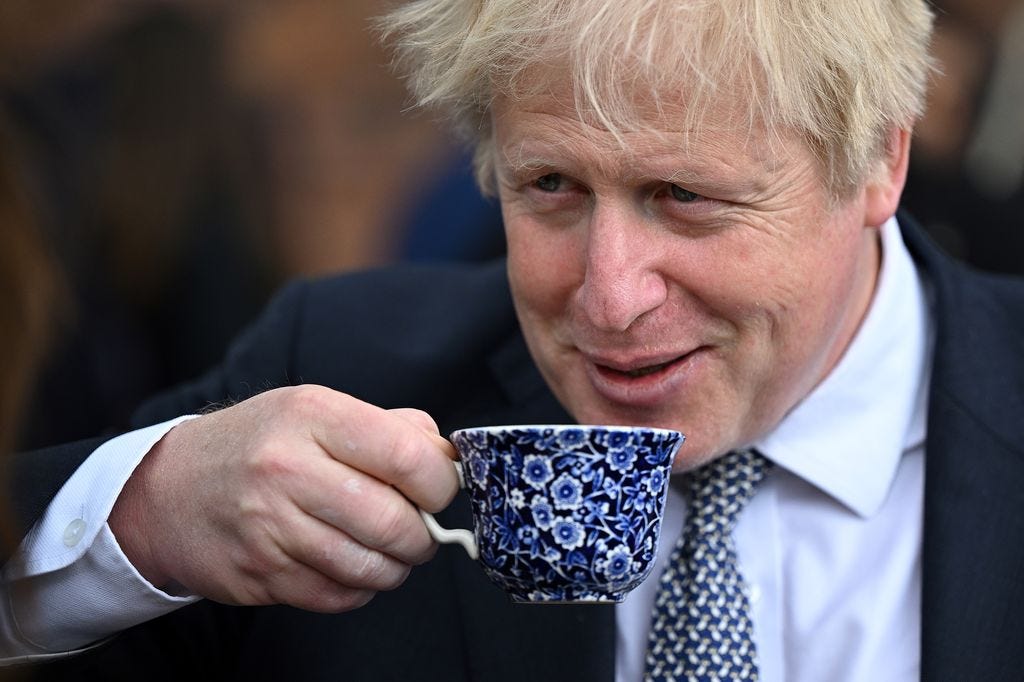The incredible shrinking Global Britain
Funding cuts and staffing turmoil at the Foreign Office are scaling back the UK’s international ambition.
LONDON — For nearly 150 years, the United Kingdom’s embassy to Japan occupied a prime piece of Tokyo real estate across the river from the Imperial Palace. The compound weathered a host of tragedies, including a break in diplomatic relations during World War II — and a 1923 earthquake.
What it didn’t survive — at least not completely — was a cash crunch caused by the coronavirus pandemic and Prime Minister Boris Johnson’s decision to merge the U.K.’s departments in charge of foreign and development policy. In October, the British Foreign Office sold nearly half the embassy grounds to the Mitsubishi Estate Group, using the profits to pay for solar panels for the rest of the compound plus upgrades to the embassy in New Delhi.
The Tokyo sale — which Foreign Secretary Liz Truss has described as part of a “huge mistake” — shows how financial constraints and plummeting morale are forcing Britain’s diplomatic officials to make increasingly difficult decisions as they chart a path for post-Brexit Britain.
The belt-tightening at the Foreign Office started before Johnson’s premiership, but has worsened to the point some in Westminster believe it’s strangling the department just as it’s being called upon to lead the U.K.’s international charge. In addition to taking back control of domestic policy, Johnson saw Brexit as an opportunity to re-engage with the wider world, especially the British Commonwealth.
Unshackled from Brussels’ foreign policy, Johnson’s newly liberated Global Britain would be free to seek out new alliances in the Indo-Pacific, manage individual relationships with EU countries and strike new trade deals across the world.
“The U.K.’s foreign policy is key to the success of Brexit, because Global Britain is very closely linked to it,” said Anand Menon, director of the UK in a Changing Europe think tank. “It’s also important because our relationships with our closest neighbors and allies have become foreign relationships again.”
The trouble came when it was time to pay for it.
Money matters
To help the foreign service achieve his aims, Johnson merged its traditional home, the Foreign and Commonwealth Office (FCO), with the Department for International Development (DfID), the organization responsible for overseas development assistance.
The idea was that the new entity — the Foreign, Commonwealth and Development Office (FCDO) — would be able to leverage the money the U.K. spends on foreign aid in service of its diplomatic and security goals.
The additional portfolios, however, did not come with a bigger check from the Treasury — quite the opposite. Citing a need to balance the books after the pandemic, Johnson cut funding for the new department by 5 percent, compared with 2019-2020. He also announced the U.K. would no longer try to honor its commitment to spend 0.7 percent of its Gross National Income (GNI) on international development, instead reducing the number to 0.5 percent until the U.K. economy recovers.
The tightened finances have been felt across the organization. The Tokyo sale is just one example of efforts to raise funds for refurbishments and upgrades in some of its posts overseas, including Washington, Paris and Beijing. The Bangkok embassy, for example, was sold in 2018 for £420 million, funding the purchase of three floors in a modern tower block for the new embassy, and improvements elsewhere.

The department argues that it’s maximizing value for taxpayers’ money, but some Conservative MPs counter that it’s undermining Britain’s prestige in the world. Former Foreign Secretary Jeremy Hunt said selling embassies, especially the Tokyo operation, “sends the wrong signal” and seems contradictory at a time when Britain is reaching out to like-minded partners in the Indo-Pacific to counter China’s increasing assertiveness.
“We need to show confidence and strength,” he added.
Replacing historic, imponent buildings with smaller, more business-like embassies has an impact on perceptions, a former minister said. “Not everyone wants to shop at Primark. People like style and projection of power, and our embassies did this.”
Truss has acknowledged the FCDO’s financial constraints in the House of Commons, but said she regretted the selling of the embassies, adding: “I certainly don’t want to see any more of that happening.”
Along with the U.K.’s formal diplomatic presence, the British Council, its main cultural and diplomatic institution abroad, is also feeling the pinch. The organization is struggling to cope with a loss of commercial income caused by the coronavirus lockdowns and a decline in the government’s grant budget compared with the years before the pandemic. As a result, it is cutting jobs and closing offices in 20 countries.
The British Council has not disclosed the number of planned redundancies, but the Public and Commercial Services (PCS) trade union said in a petition that “15 to 20% of staff will be cut from the organisation” — with some areas losing up to a third of their personnel. British Council employees took industrial action over two days in late March.
“Rushing through restructuring, with little or no political or public scrutiny or oversight will be a disaster for public spending and for Britain’s global soft power influence, which supports the government’s Global Britain agenda,” the union said.
When it comes to budget cuts, the biggest impact has been to development assistance, where the drop in spending has coincided with a shifting of resources toward countries where the U.K.’s development, security and economic interests align, such East Africa and the Indo-Pacific region.
As a result, the U.K. has withdrawn from programs in areas seen as less key to its national interest. Spending on conflict prevention work in northern Africa and the Middle East was cut by some £90 million, and programs in Syria suffered a 69 percent cut in 2021-22, according to the National Audit Office, the U.K.’s public spending watchdog.
The Treasury forecasts the aid budget could be restored by 2024-25 depending on the performance of the U.K. economy, but some officials say that given the merger, the timing couldn’t have been worse.
“To lose one-third of your budget as you’re trying to organize a new department of state, I think added massively to the problem,” said Simon McDonald, a former permanent undersecretary at the FCDO.
Staffing counts
Compounding the FCDO’s difficulties is a flurry of changes at the top of the organization taking place even as the workload piles up given the U.K.’s global ambitions, the need to manage relations with the EU and, more recently, the Russian invasion of Ukraine.
“The department is so unwieldy right now,” an FCDO official said. “It’s like three departments shoved into one, with all the responsibilities of DfID and [the Department for Exiting the European Union] DExEU and now a war.”
Turnover of the Foreign Office’s top political jobs has been so quick that British diplomats posted overseas complain they struggle to liaise with London.
Truss is the fourth successive Conservative politician to serve as foreign secretary in the last four years. In the last seven months, three ministers for Europe have cycled through the government, leading to some within Truss’ team to worry that some Tories see the department as a ladder to be climbed quickly to reach more media-friendly and senior government positions.
They argue that ministers need to stay for three or four years to build relationships with counterparts overseas if they are to make a difference.
Meanwhile, civil servants across the organization are on edge, after they were informed by a message on the department’s intranet in January that there could be staff cuts of up to 10 percent. Johnson ruled this out as “fake news,” but a long-delayed publication of a workforce plan has done little to boost morale.
Truss told MPs in March that the workforce plan will focus not on cuts but on redeploying officials toward work on economic security, tackling disinformation and forging alliances to develop technologies such as quantum or artificial intelligence. But her efforts have done little to dispel staff concerns.
A spokesperson for the PCS union said they expect a voluntary redundancy scheme to be followed by compulsory dismissals because not enough personnel will want to leave. “Morale is incredibly low, and there’s a feeling of understaffing in some areas, with people being shifted from crisis to crisis,” the spokesperson said.
Incomplete merger
Part of the reason the FCDO has been unable to take full advantage of the benefits of Johnson’s merger is that it remains incomplete, with tensions persisting between the two teams.
“There has been a culture clash of these two departments, very different in culture, one where at this point, I think, the DfID wing has got the worst of it,” said Bronwen Maddox, director of the Institute of Government think tank.
McDonald, who left the FCO weeks before the merger with DfID, argues that the new organization’s board is now “huge” with two permanent secretaries and 10 directors general and said the “necessary rationalization” of top jobs is still pending.
“Money is needed in a merger because there has to be some sort of restructuring and that costs money,” he said.
“The top of the new organization is in my judgment too big,” he added, arguing that jobs needed to be shed “in order for a coherent new structure to emerge. As far as I can see, none of that is in the offing.”
Stephanie Draper, chief executive of Bond, a network of more than 400 NGOs working in international development, warned of a “brain drain” of development staff at the FCDO, with at least 213 DfID officials reportedly having quit their jobs in the aftermath of the merger.
A long-delayed international development strategy for 2022-23, published Monday, sets out a target to reduce the proportion of British overseas aid allocated to multilateral bodies such as the United Nations from 40 percent of the total budget to 25 percent by 2025, but it’s light on details regarding specific funding allocations. It also links the provision of aid to access for U.K. goods and services.
This means the strategy amounts to a “double whammy against the poor,” said Sarah Champion, Labour chair of the Commons international development committee.
An FCDO spokesperson said: “We keep our structures under constant review to ensure the department can tackle the biggest issues facing the U.K. and the international community as effectively and efficiently as possible.”
Despite the current troubles, not everybody is pessimistic about the long-term effects of the merger. Robin Niblett, who is stepping down as director of think tank Chatham House at the end of July, said the FCDO is in a stronger position after absorbing DfID.
“The last year, from what I understand, there has been a huge amount of disruption and destruction as a result of it,” Niblett said. “But you’ve got to think about the long game.”
Esther Webber contributed reporting.
Courtesy of Politico





